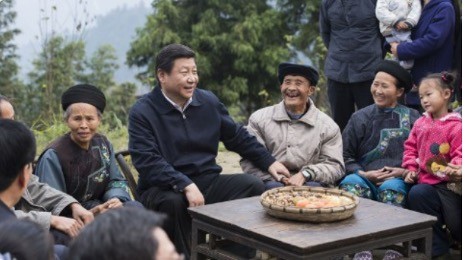
SINGAPORE — Senior officials in Beijing have been increasingly vocal in lavishing praises and pledges of loyalty to Chinese President Xi Jinping, as the country’s leader is slated to firmly hold his grip on power for a third term in the upcoming October 16 Chinese Communist Party (CCP) Congress.
The meeting of the 25-member Politburo, the principal policy-making committee of the Communist Party of China (CPC), which met September 9, announced:
It was emphasized at the meeting that the 20th CPC National Congress is a convention of great significance to be held at a crucial moment.
Under the firm leadership of the CPC Central Committee with Comrade Xi Jinping at its core, efforts should be made to unite the whole Party and all the Chinese people and lead them in building on past achievements.
The ruling Communist Party announced that it would amend its constitution at the October 16 congress, and Xi is expected to further elevate his position and entrench his hold on power.
Such a constitutional amendment comes five years after the last revision at the party congress that attached Xi’s name to a body of guiding thoughts.
Recent weeks have also seen various Chinese ministries and local governments conducting study sessions on Xi’s ideology and past government statements.
Moreover, state media in China have been awash with adulation for the nation’s top leader, including laudatory comments by Fu Hua, chief of Xinhua news agency, and Shen Haixiong, head of China Media Group.
In the most recent monthly journal of the Cyberspace Administration of China, published online September 2, Fu wrote that Xinhua’s “primary political task” is to do a “good job” in advocating for Xi’s ideology and political plans.
“We will not stand outside the party’s ranks even for a minute, we will not deviate from the direction of General Secretary Xi Jinping even for a minute and will not leave the vision of General Secretary Xi Jinping and the party’s central committee even for a minute,” Fu declared.
Echoing such sentiments were Shen’s comments in a study session involving China’s state broadcaster on August 1. Shen proclaimed that as long as Xi was the “core of the party,” the party could “overcome any obstacles on the road forward.”
Meanwhile, China Central Television (CCTV), a state-run media platform, also published a series of Chinese-language articles sympathetically portraying Xi as a “man of the people.”
In one particular article, CCTV showcased the country’s top leader sitting around rural folk, showing his “oneness” with the “everyday man.” Xi was reportedly quoted to have said that he too, like Chinese rural inhabitants, was “from the countryside,” likening his concerns to those of country folk and farmers.

Official applause for Xi has broadened to different parts of his political ideology, otherwise known as “Xi Jinping Thought on Socialism with Chinese Characteristics for a New Era.”
Formally incorporated into the lexicon at the 19th National Congress in October 2017, this lengthy phrase, typically called in Mandarin Chinese the leader’s “banner term,” or qizhiyu, is meant to reflect Xi’s legacy and position as the CCP’s top leader.
That this phrase was officially included in the amended CCP Charter at the 2017 congress was significant, as it signaled Xi’s ascent to a degree of personal power not witnessed since his predecessors Deng Xiaoping and Mao Zedong. Both Deng and Mao also had their names included in their banner terms.
There have been several abbreviations of Xi’s banner term developing within Chinese political discourse and implemented in particular policy areas.
A 2018 China Discourse Report indicated over 20 various permutations of Xi’s banner term in the party-state press in 2018. These can be deemed as strategic moves in Xi’s long-term rhetorical game, in which his eventual goal would be the final transformation of his 16-character banner term into a truncated version of this phrase, thus placing him on a rhetorical equivalent with Mao: “Xi Jinping Thought.”
There are plausible signs that Xi’s plans could materialize. At a meeting on Friday, the Politburo announced that the party’s constitution would have amendments at the upcoming congress, with “major theoretical views” to be incorporated into it.
“It goes beyond putting Xi Thought on a par with Mao Thought. Xi’s ambition is not to reach Mao’s level but to surpass it,” said Professor Steve Tsang, who heads SOAS University of London’s China Institute.
It is evident that Xi is “very confident” about getting his plans realized at the 2022 party congress, opined Tsang.
“The outpouring of adulation looks orchestrated to prepare the party and the people for the ‘re-election’ of Xi as leader of the Communist Party and, thus, of China,” he elaborated.
Just like his predecessors, Xi holds three positions at present: the country’s president, the Communist Party’s general secretary, and head of the Central Military Commission.
Although his predecessors were bound to a two-term presidential term limit, the amendment of China’s Constitution in 2018 removed these term limits. Consequently, should Xi remain as party leader after October’s congress, as is generally predicted, he could continue as president for a third term during legislative meetings in March 2023.
Also widely anticipated by both domestic and international observers is Xi’s intended policy direction to feature China’s power in its domestic maritime arena, as well as future policies regarding major powers like the United States, Japan, India, and Australia.


